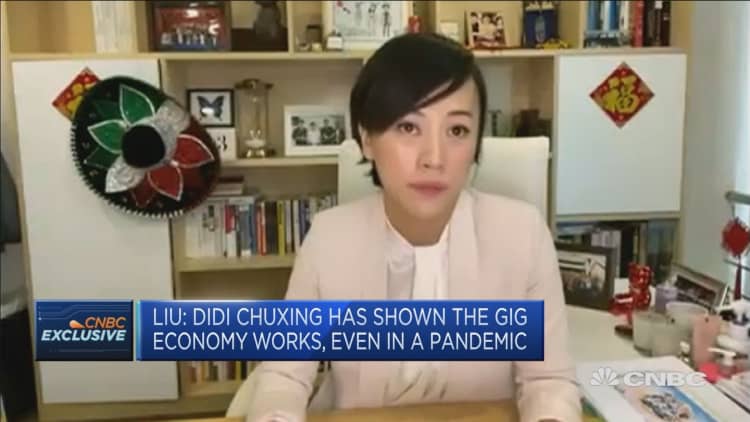
DiDi President Jean Liu told CNBC that the company's core ride-hailing business is profitable, and that it has picked up again after the coronavirus outbreak hit China, its home market.
"I can share with you the core business is profitable or (making) a small profit," Liu said in an interview that aired on Thursday.
Liu did not give specific figures or say which measure of profitability she was referring to.
However, it's the first time the Chinese technology firm has made the claim, as long-term viability of the ride-hailing sector continues to be called into question.
Liu also said that DiDi's ride volume in China has reached 60% to 70% of pre-coronavirus levels and is five times its February low. China was effectively shut down for a number of weeks as Wuhan, where the coronavirus was believed to have originated, was cut off from the rest of the country. But in recent weeks, the country has started relaxing travel restrictions again, and Wuhan has re-opened.
Headquartered in Beijing, the company operates in China and eight overseas markets including Australia and Japan.
DiDi's president said that recovery of the business is taking place at a different pace in different markets.
"There has been a very steep drop and a very sharp comeback (in China). And now you … can see our businesses (is) five-times (the) February low. So there's certainty here," Liu told CNBC. "But for different countries, there's different strategy. Some counties, there's a less strict social distancing restriction. And we see ... not that sharp drop. However, the bounce back is uncertain as well."

She also said that despite the outbreak, the long-term potential for the company has not fundamentally changed.
"We're in this business that needs long-term commitment and we think we are probably, among everyone, we're the most committed and invested in this industry," Liu said, adding the company is investing in areas from artificial intelligence to autonomous cars.
The outbreak has hit ride-hailing companies around the world. In the U.S., Lyft said last month that it was laying off 982 employees.
So far, DiDi has not axed roles and Liu said the company currently has no plans for job cuts or raising capital.
"We have a very strong balance sheet," she said.
DiDi has raised over $21 billion from investors including SoftBank and Japanese carmaker, Toyota.
Adapting to coronavirus
Liu said the company was "overwhelmed" when the outbreak first occurred in China earlier this year and its core team got together to figure out what to do.
The focus was on protecting drivers and riders. DiDi set up service stations to give masks and disinfectants to drivers, it offered free rides to medical workers across a number of Chinese cities, and it began installing a protective sheet in cars to separate the driver from his passengers.
We're a young player, but we are going global. And from this crisis ... we know that we can leverage our best practice in China and ... share with other countries.Jean LiuPresident of DiDi
Around 300,000 drivers signed up to give free rides to medical workers, according to Liu.
"I'm so grateful for them because it took a lot of courage to actually go out there and help people when the whole city is down," she said.
Liu also said the company took what it learned from China during the virus outbreak to its other markets to help it adapt. She added that international expansion will continue.
"We're a young player, but we are going global. And from this crisis ... we know that we can leverage our best practice in China and ... share with other countries," Liu said.


